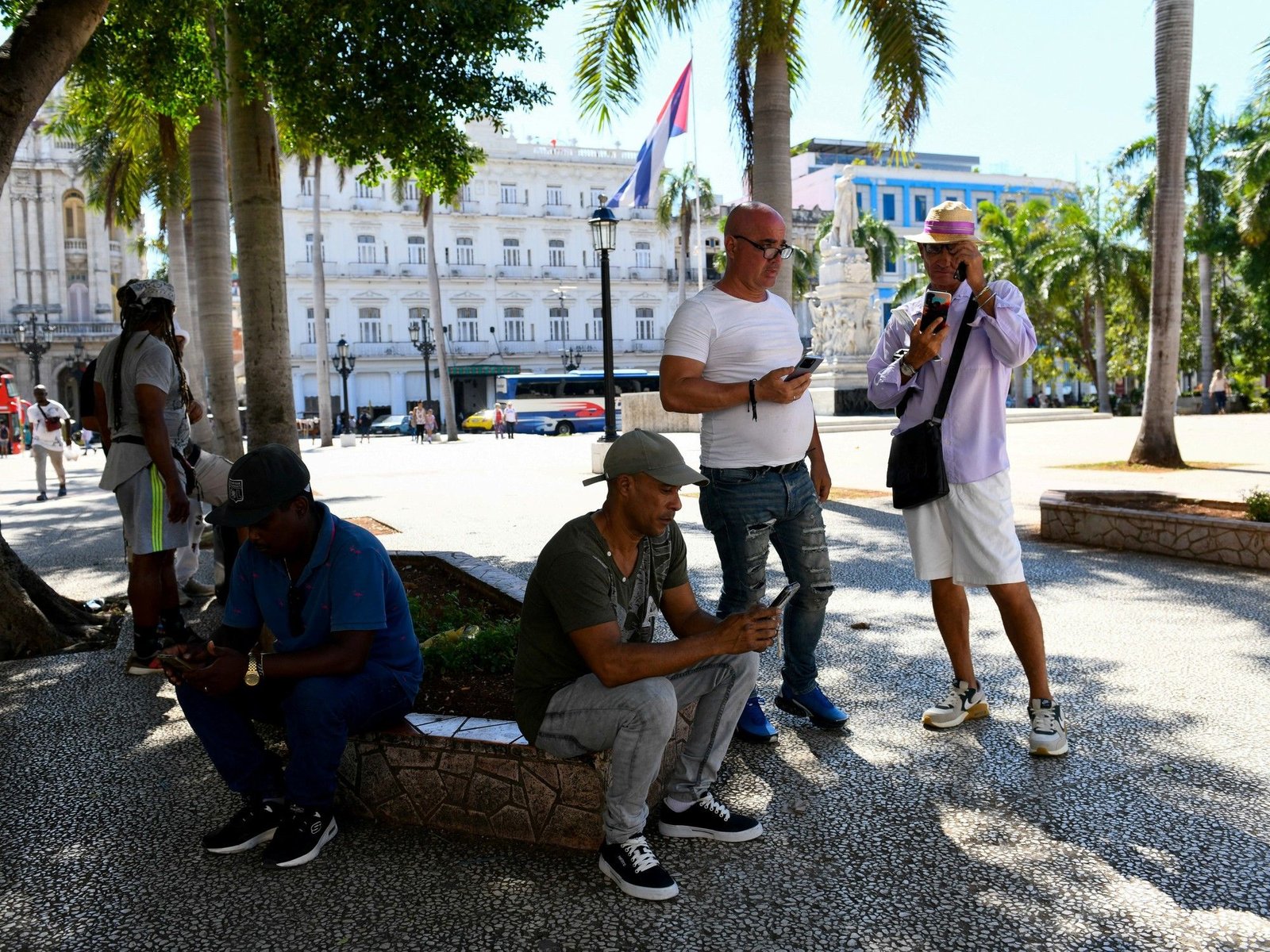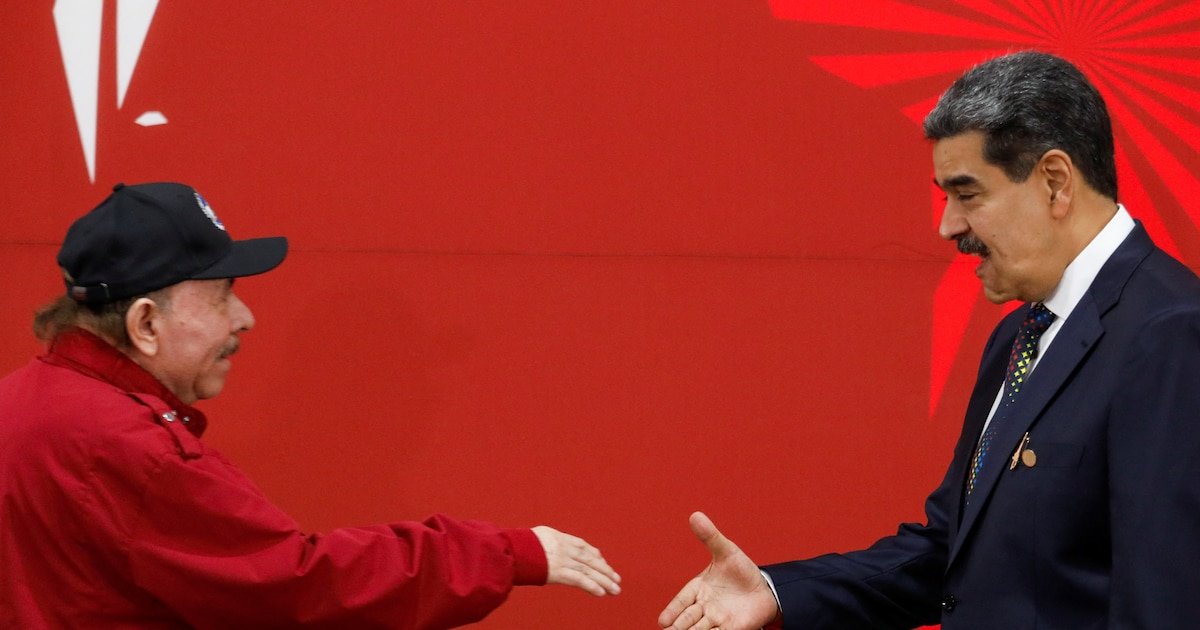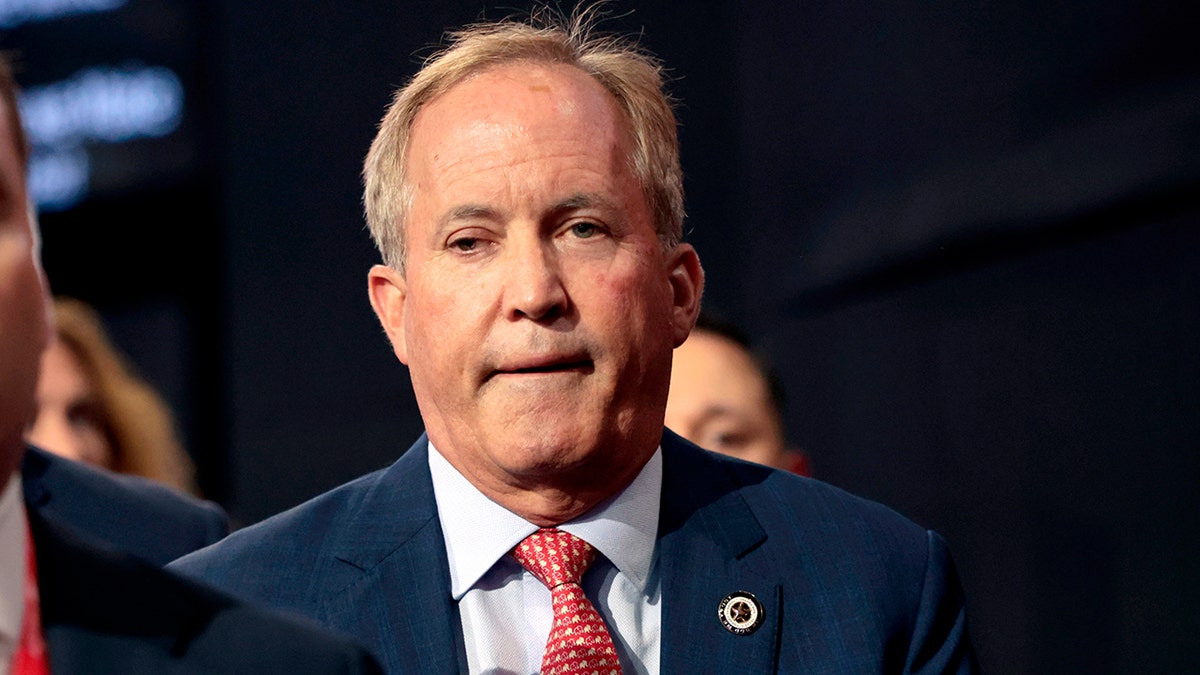INTERNACIONAL
El régimen de Cuba defendió el tarifazo al internet para los celulares: «Si no lo hacemos, habrá un inminente colapso tecnológico»

INTERNACIONAL
Jaime Bayly: “Maduro estaría planeando fugarse con su familia a Nicaragua”

Caracas, Managua y Miami concentran en estos días la atención internacional por los recientes movimientos del dictador venezolano Nicolás Maduro, según declaraciones del periodista Jaime Bayly y reportes de la cadena NTN24.
Diversos indicios apuntan a la posibilidad de una inminente fuga de Maduro y su círculo familiar hacia Nicaragua, aliado político clave del régimen chavista en la región, en medio de un incremento de la presión militar y judicial de Estados Unidos sobre los líderes del chavismo.
“La noticia más importante del día es que el dictador venezolano Maduro estaría planeando fugarse con su familia, es decir, con su esposa, con el hijo que tiene con ella y con los tres hijos que ella tuvo de una anterior relación, a Nicaragua”, afirmó Bayly.
Aunque ni Maduro ni su esposa Cilia Flores ni sus hijos estaban a bordo, el periodista planteó otra posibilidad: “Aparentemente el avión iba cargado. ¿Cargado de qué? Bueno, cargado de dinero. Cargado de barras, de lingotes de oro. Maduro estaría llevando parte de su fortuna mal habida a Managua”.
“El avión presidencial de Maduro, que es un Conviasa 737 bastante obsoleto, voló desde Maiquetía (Caracas) hasta el aeropuerto de Managua. Esto ha sido registrado y descubierto por personas que rastrean vuelos en el mundo. La pregunta es: ¿por qué voló el avión presidencial de Maduro a Managua?”, agregó.
La información de Bayly coincide con reportes de plataformas de monitoreo aéreo como FlightRadar24 que detectaron el vuelo de un avión Airbus A340, matrícula YV1004, de la aerolínea estatal Conviasa, utilizado habitualmente por altos funcionarios venezolanos, entre ellos Maduro y Diosdado Cabello, informó NTN24.
El aparato despegó del aeropuerto de Maiquetía, que sirve a la ciudad de Caracas, y tras cruzar brevemente el espacio aéreo de Honduras ingresó a territorio nicaragüense, donde aterrizó en el Aeropuerto Internacional Augusto C. Sandino de Managua. NTN24 señaló que esta misma aeronave ya había realizado un vuelo similar entre Maiquetía y Managua el 15 de agosto y que, en otra ocasión reciente, un avión de Conviasa desvió su ruta a La Habana para regresar finalmente a Caracas.
Bayly, por su parte, subrayó que estos vuelos se producen en un contexto de máxima tensión política y judicial.
“El dictador venezolano Maduro estaría planeando fugarse con su familia a Nicaragua”, aseguró el periodista. Bayly añadió que el traslado reciente del avión presidencial podría haber servido para transportar “maletas, valijas, cajas llenas de dólares, de euros, principalmente de euros y de lingotes de oro”.
El periodista aseguró que Maduro estaría llevando parte de su fortuna mal habida a Managua, en previsión de que eventualmente, “Trump pudiera ordenar a su fuerza militar que entre a Venezuela a capturar a Maduro por ser el jefe de un cartel de narcotráfico, el cártel de los Soles“.
Según Bayly, la fuente original de esta versión es el periodista venezolano Emmanuel Rincón, quien sostuvo que Managua, bajo el control político de Daniel Ortega y Rosario Murillo, permanece como el principal refugio contemplado por el círculo cercano de Maduro en caso de una intervención estadounidense. “Maduro siempre pensó en Managua como su primera opción para fugar, y no ha cambiado de opinión”, indicó Bayly al citar a Rincón.
También se refirió a un aspecto clave de la coyuntura regional: la utilización de aeropuertos cercanos como bases de operaciones militares.
“La periodista Nitu Pérez Osuna ha denunciado que los aeropuertos en Curazao y en Aruba no están ya permitiendo vuelos directos a Caracas, y que hay ciertos cambios que podrían sugerir que estarían siendo evaluados como eventuales puntos desde los cuales despegarían aviones de Estados Unidos rumbo a Venezuela”, relató.

A esto se suma la disposición de Trinidad y Tobago de colaborar con una eventual acción militar estadounidense. “También se estaría entonces considerando usar los aeropuertos de Curazao, de Aruba y ciertamente de Trinidad y Tobago, que también se ha ofrecido a colaborar con la intervención militar de Estados Unidos en Venezuela, si ella llegara a ocurrir”, añadió Bayly.
La presión internacional se ha incrementado tras el envío de buques de guerra estadounidenses al sur del mar Caribe. La administración de Donald Trump, acusó formalmente a Maduro de liderar el Cartel de los Soles, calificado como una organización terrorista responsable del tráfico de cocaína y fentanilo hacia Estados Unidos, lo que también ha elevado el nivel de vigilancia sobre los desplazamientos aéreos de funcionarios y vuelos oficiales venezolanos.
En paralelo, Bayly reportó que en Miami, tres familias estadounidenses —los Kennemore, Marval y Saad— han interpuesto demandas contra Maduro, Cabello, Padrino López y otros miembros del régimen, acusándolos de secuestro y tortura. Según consigna Bayly, estas acciones legales se originan en represalias tomadas luego de la detención del empresario Alex Saab, considerado testaferro de Maduro y extraditado a Estados Unidos. Las familias alegan que fueron utilizadas como rehenes para facilitar un posterior canje de prisioneros tras pasar casi dos años en cárceles venezolanas.

Mientras tanto, líderes políticos de diversos países de la región, como el presidente paraguayo Santiago Peña, han reforzado sus denuncias sobre la legitimidad del gobierno de Maduro y su vinculación con redes internacionales de narcotráfico. Por su parte, el presidente colombiano Gustavo Petro y dirigentes chavistas como Cabello han intentado desmarcar a Venezuela del control de dichas operaciones, alegando que el “Cartel de los Soles no existe” y trasladando la atención hacia agentes externos como la DEA.
Los movimientos del aparato estatal venezolano, especialmente los vuelos hacia Managua y el aumento del cerco judicial y diplomático, son interpretados como señales de la creciente incertidumbre sobre el futuro de Maduro y su círculo, en una coyuntura marcada por investigaciones internacionales y operaciones militares en el Caribe. Las recompensas ofrecidas por la captura de Maduro, Cabello y Padrino López alcanzan los 80 millones de dólares, con varios procesos abiertos tanto en Nueva York como en Miami.
INTERNACIONAL
Texas challenges Newsom’s gas car crackdown, warning California can’t dictate US auto market

NEWYou can now listen to Fox News articles!
The state of Texas is intervening in California’s attempts to implement stricter vehicle emissions standards than those set by the federal government.
After Congress and Trump revoked three waivers the Biden administration granted California, which allowed the state to set stricter vehicle emissions standards than those at the federal level, Newsom immediately sued and issued an executive order directing state agencies to continue pushing the heightened standards. California’s attempt to circumvent Congress could impact other states, since provisions of the federal Clean Air Act allow them to adopt California’s tougher emissions regulations as opposed to the federal baseline.
Meanwhile, a few weeks after Newsom’s executive order, the Trump administration announced it would sue California in an effort to prevent them from trudging forward with the «unlawful» emissions standards. Now Texas is joining that fight with the help of pro-Trump legal group America First Legal (AFL).
NEW RESEARCH REVEALS HOW EV, EMISSIONS MANDATES ARE INFLATING COSTS FOR GAS-POWERED CARS, UTILITIES
«California’s crusade is not about innovation—it is about abusing the legal system to flout federal law and impose its radical agenda on all Americans,» said Daniel Epstein, vice president of America First Legal. «America First Legal stands proudly with the State of Texas to defend competition, consumer choice, and the rule of law. We will not let Gavin Newsom remake America in California’s image.»
California Gov. Gavin Newsom is seen alongside congested traffic amid his push to phase out gas-powered vehicles — a move now facing pushback from Texas officials and the Trump administration. (Getty Images)
Texas’ motion to intervene, filed Friday with the United States District Court for the Northern District of California Oakland Division, asks the court to allow Texas to become a party to the case so it can defend the interests of Texans, which state Attorney General Ken Paxton and AFL say would be impacted by California’s attempt to impose strict electric vehicle mandates that can have an effect on the rest of the country.
«I am standing with President Trump in his effort to stop Gavin Newsom and California from shoving its insane so-called ‘green energy’ vehicle standards down the nation’s throat,» said Paxton. «Texas will not look the other way while the failed state of California undermines our sovereignty, attacks America’s energy independence, and intentionally adopts destructive policies that would harm the other States.»
Currently, 17 other states and the District of Columbia have chosen to adopt at least part of California’s vehicle emissions standards, according to a report released this month by the California Air Resources Board. The same report notes that, collectively, these states represent 40% of the nation’s light-duty vehicle market, and 25% of its heavy-duty vehicle market.

Workers at a Hyundai electric vehicle manufacturing plant in Georgia assemble vehicles on the production room floor. (Elijah Nouvelage/Bloomberg via Getty Images)
TRUMP V. CALIFORNIA: SANCTUARY CITIES TO EV BANS, TRUMP PUTS LEFT-WING STATE UNDER REPEATED SCRUTINY
California’s efforts to implement stricter car emissions regulations would effectively outlaw the sale of new gas- and diesel-powered vehicles by 2035, AFL argued in a press release accompanying their Friday filing. Subsequently, AFL notes, the strict regulations would then impact car manufacturers because they would «dictate the requirements for all cars sold throughout the United States» since manufacturers typically do not produce different vehicle lineups for different states.
«That means fewer choices for families, skyrocketing costs, and an America remade in California’s image,» AFL stated in its press release.

Ken Paxton, with America First Legal, is taking legal action to halt California from implementing strict vehicle emissions mandates that they argue could impact the whole country. (Hannah Beier/Bloomberg via Getty Images)
In addition to the state of Texas, a major pro-business group, the American Free Enterprise Chamber of Commerce (AmFree), has also taken action to intervene in the case on the side of the Trump administration, with several agricultural and trade organizations backing the move.
CLICK HERE TO GET THE FOX NEWS APP
«It’s clear this is not one of those issues that is like ‘the Trump administration doing something completely novel’ and ‘courts having to wrestle with that,’» said Michael Buschbacher, the lead attorney working with AmFree. «This is like squarely, ‘Congress passed the law. You can’t undo that law unless it’s unconstitutional and there’s nothing unconstitutional here.’»
Fox News Digital reached out to Gov. Newsom’s office for comment, but did not receive a response in time for publication.
Fox News Digital’s Charles Creitz contributed to this report.
california,electric,gavin newsom,texas,politics,congress,donald trump
INTERNACIONAL
El gobierno francés, bajo presión: por el ajuste, el premier François Bayrou enfrenta un voto clave en la Asamblea

Voto de confianza = Voto de censura
Contexto nacional e internacional
El peligro de la deuda
Eliminar días festivos
Francia,Emmanuel Macron,Economía

 DEPORTE3 días ago
DEPORTE3 días agoChile organizó una colecta para que la familia del hincha que fue operado por fractura de cráneo pueda viajar a la Argentina

 DEPORTE3 días ago
DEPORTE3 días agoEl fútbol chileno se solidarizó con la U tras los graves incidentes que se registraron ante Independiente

 DEPORTE2 días ago
DEPORTE2 días ago¿Cómo va el historial entre Rosario Central y Newell´s Old Boys y quién ganó más?




























